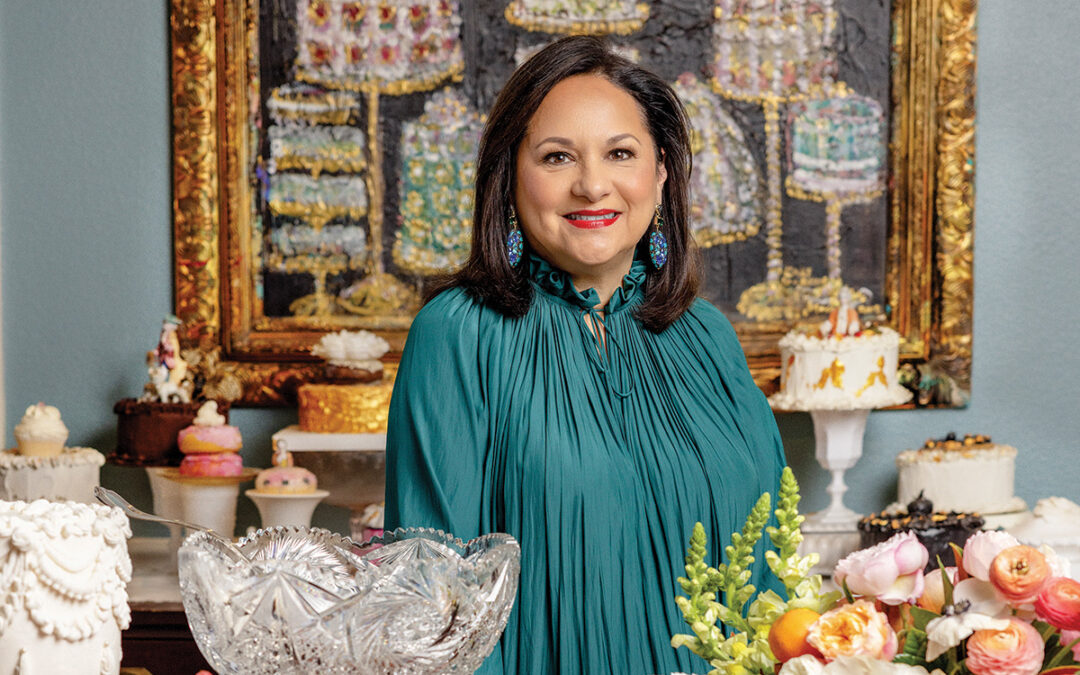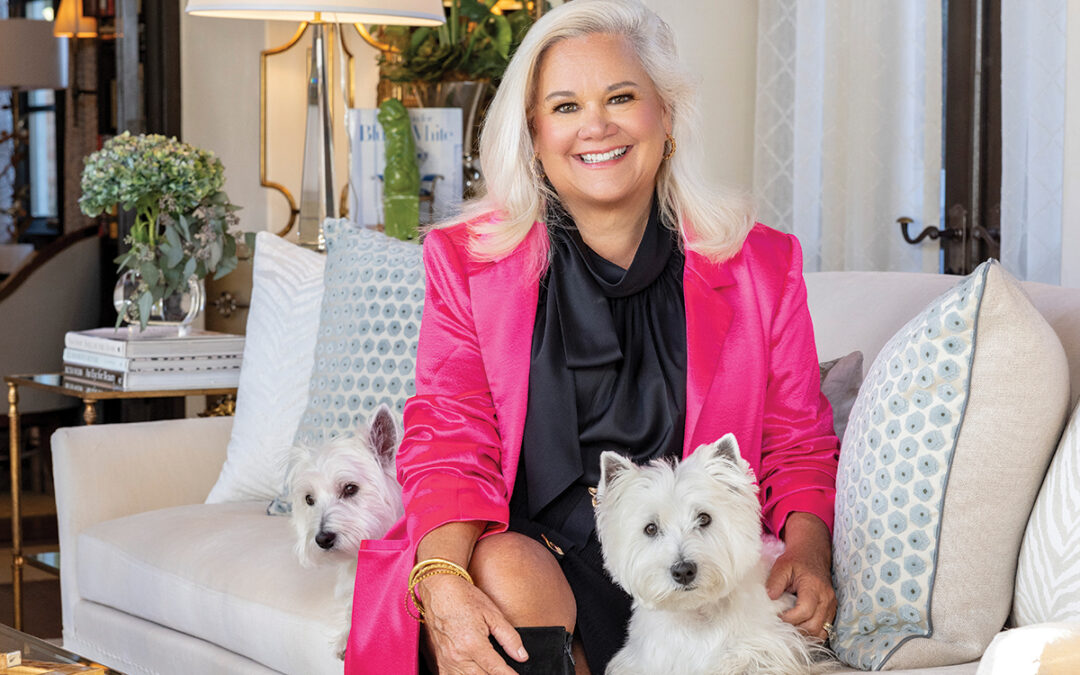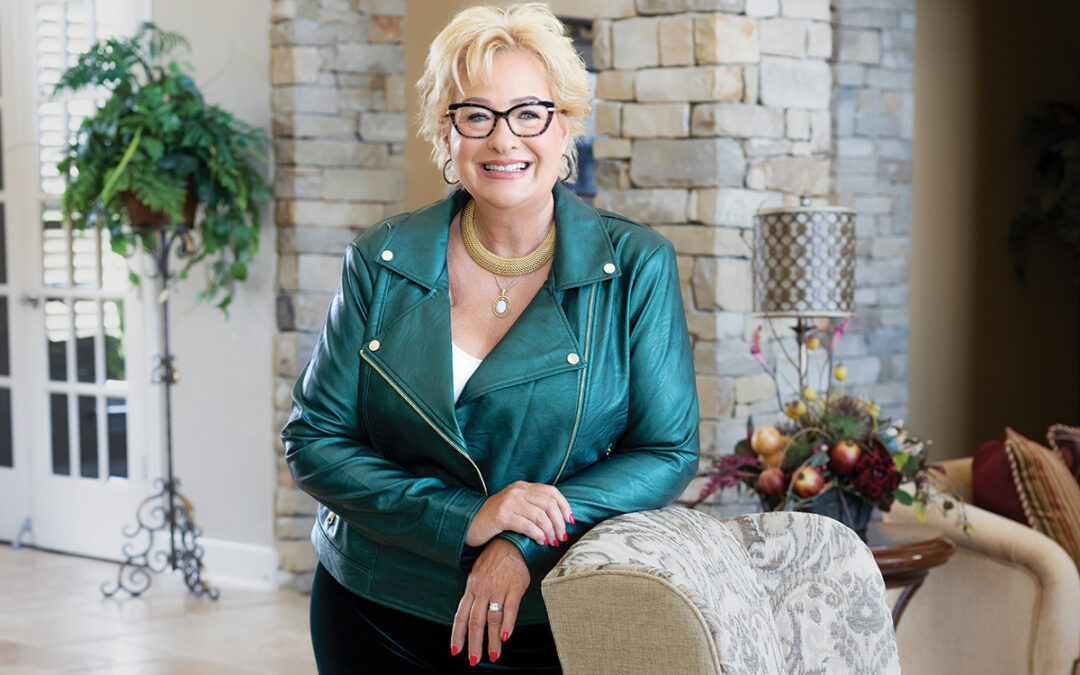For Erin Barry, home is where you live right now. Married to San Antonio Spurs guard Brent Barry, she’s followed her husband as his basketball career has placed him on five different teams in 11 years. With each new city, she’s determined to cultivate the sort of stability that makes their lives more grounded, less nomadic.
She makes their home the sort of haven that, once you walk in the door, you know you’re home, no matter which city happens to be on the other side of that threshold. She also seems to find ways to immerse herself in the community that makes it seem like she’s a native.
Barry prefers utterly unpretentious work in the trenches to token community roles. And it’s the trenches where she found her calling. While her husband played basketball in Chicago, she became a court-appointed special advocate and a juvenile court caseworker, setting the precedent for similar work when the couple relocated to Seattle.
The Barry family moved to San Antonio in 2004, amidst a rash of high-profile child abuse and neglect cases. With nearly a decade of experience as an advocate for abused and neglected children, Barry decided it was the right time and the right place to take herself out of the trenches and put her experience to work at the next level.
Being an advocate for abused and neglected children is gritty, heartbreaking work. Every day, there’s another face, another story that seems impossible to forget. There are days when Barry brings the sadness home with her, and she relies on perspective to keep her going. She knows that most people don’t want to get that close, because the horror so many of these kids endure takes an emotional toll.
She is determined to make an imprint on as many people as she can, believing that the more people connect emotionally to kids who need help, the closer we get as a community to losing the weight of a sad legacy carried by so many families. “It is hard, it’s very hard work,” she says. “People always ask me how I do it. I say, “How can I not do it?'”
In fairly short order, Barry got connected in San Antonio. She joined the executive committee of the Blue Ribbon Task Force (www.blueribbontaskforce.org), led by State Representative Carlos Uresti and Bexar County District Attorney Susan Reed. There, she was thrust into an environment different from the hands-on casework she was accustomed to.
Suddenly, she was in a more political environment: Helping to write a House bill that would go to Austin, participating in lobbying efforts at the state level and working alongside lawmakers who were urgently trying to overhaul a collapsing child welfare system. The result of her work from a legislative standpoint is Senate Bill 6, which mandates sweeping reform for Child Protective Services. “I knew how to do the work on the front lines, and I was familiar with how things work in other states. I had no idea how the system works in Texas, how the special interest groups and the lobbyists operate. There was such a learning curve for me,” she says.
As proud as she is of her accomplishments here, Barry yearns to return to the casework that allows her to make a more intimate connection with the people she helps. “I like to get my hands dirty … to work hard,” she says. “I like to meet people, and to know who I’m helping.” Going back to the front lines may also help her facilitate what she sees as a key issue. “We need to put the focus on prevention,” she explains.
She says San Antonio is different from many cities in how it bears the burden of child abuse. “People here recognize the problem,” she says. “Here, when something happens, it’s front page news. In a lot of other cities, it’s nothing but a paragraph. People here care about this problem.”
She and her husband also created “Barry’s Blue Ribbon Assists,” a fund-raising effort that operates under the Spurs Foundation, in conjunction with the task force. Through that channel they have raised thousands of dollars and garnered corporate sponsorships that help stage an annual 5k run/walk event and provide tickets for each Spurs home game expressly for CPS caseworkers and their guests — an opportunity to escape the stress that their jobs generate. In 2005, Barry was appointed to the Bexar County Child Welfare Board, and she is on the steering committee for the Heart Gallery of San Antonio, which puts the faces and stories of kids waiting for adoption in front of the community.
Fork in the road
As for adoption, Barry considers the events surrounding her birth to be the defining moment that set the course for her life. Born to a single, teenage mother, she was adopted by a couple that later added three biological children to the family. She always knew she was adopted. “It was kind of obvious,” she jokes. “Here I was with my dark hair and olive complexion, in this Irish/Polish family.”
She keeps a reverent place in her heart for the wrenching decision her birth mother made. “When I was born, she doubted her decision to give me up for adoption and kept me with her for several days. When you’re a mom, you understand the connection you make with your baby in those first few days and how hard that must have been for her to give me up. Her decision changed my life,” she remarks.
Barry grew up in a small town near San Francisco and attended an all-girls’ Catholic school. As the eldest sibling, she was the empathetic one, the mother hen who attended to scraped knees and hurt feelings. “I always knew I would be a mom someday,” she says.
It was in that setting that she met Brent Barry, who attended the boys’ Catholic school across the street. They began doing things together as friends, but Erin clearly remembers when Brent became her boyfriend. “We went to a movie, National Lampoon’s Christmas Vacation — that tells you how long ago it was! I remember looking at him in the theater, and at that moment, Cupid drew back his bow. I was 16 years old and I just knew he was the one I wanted to be with. That was it.”
She knew her boyfriend liked basketball and had dreams of playing professionally. She remembers the first game she attended: “Brent took me to a Golden State Warriors game. I remember looking up in the rafters, and I saw a retired jersey hanging there with the name “Barry’ on the back. I said something like, “Hey, look, there’s a jersey with your last name on it!'” The jersey belonged to Brent’s dad, NBA Hall-of-Famer Rick Barry. “My dad was so embarrassed that I didn’t know who Brent’s dad was,” she laughs.
Life had a way of working in their favor. She planned to attend the University of Oregon. Brent got a basketball scholarship to nearby Oregon State. After his first couple of seasons in the NBA, they married in a cathedral wedding in San Francisco in 1998.
Today, after spending more than half their lives together, the 33-year-old Barry says the main attraction has always been laughter. “He still makes me laugh, and he makes me feel special; it’s never about him,” she says.
Their exchanges involve lots of playful banter. “We get the biggest kick out of each other; I just enjoy his company,” she says. “After all these years, he’s my best friend. I want to be with him all the time. People always talk about how hard marriage is, and I’m asking myself, “Is it me? Is there something I’m not doing right?’ Because for me, being married to Brent isn’t hard at all!”
Home court
Barry is the self-described taskmaster and organizer in the family; her approach on the domestic front is just as hands-on as it is in her outside endeavors. Their home’s focus is more on comfort than designer showcase.
Houseguests are likely to find toys on the floor, courtesy of their five-year-old son, Quin. The Barrys’ most recent addition is six-month-old son, Cade. She also tries to compensate for the fact that her husband’s work schedule doesn’t fall neatly into the 9-5 framework. “It’s hard to make friends, to build that network outside of basketball when our schedule is so different from everyone else’s,” she says. “I’m a little jealous, actually, that other moms have that more traditional schedule.” Quin is only beginning to understand what his dad does for a living and why people recognize him in public.
“One morning, after a game where Brent made the winning three-point shot, I told Quin to go in and wake up his dad by saying, “Daddy, that was a great shot last night!’ So, Quin went in there and said that to Brent, who turned over to Quin and asked, “Did you really see that shot I made?’ Quin responded by asking, “Yeah, um, can we play light sabers now?’
“I’ve created a place where we’re happy to be home,” she says. “I love to cook, and I’m good with uncomplicated dishes. I have to follow a recipe — I can’t make it up as I go or just throw a bunch of things together and have it taste good. Brent loves Italian food, and I try to make a lot of his favorites. When Brent is home, we always eat as a family.”
Barry describes their lifestyle as understated, in relation to the material excess that is associated with the lives of so many professional athletes. “Excess doesn’t make you feel better,” she says. “There was a time when I was younger and I got a little caught up in it; I thought I should have the designer handbags — it just wasn’t me. Brent’s the same way. When he’s not playing basketball, he’s a surfer and that look is very casual!”
She’s more comfortable in her favorite T-shirt and sweats from a discount retailer than a haute couture ensemble. She’s content to curl up in a favorite corner of her house and retreat with a good book, though she confesses she doesn’t actually get to do that very often. She says, “I have a degree in English Literature — I dream of reading! I never seem to have time for it, but it sounds so nice, to just take a few minutes for yourself like that.”
Barry’s an unrepentant mom and homemaker, in a day and age where that role doesn’t always get the respect it deserves. She wishes more women would be proud to be mothers, and she sees a shift toward that way of thinking.
“For so many years, women thought we had to be corporate and have careers that took us away from our families. I see a lot of moms now moving away from that and back toward their families. They’re downscaling their lives so their kids can be the priority,” she says. She connects the dots between her affinity for motherhood and the challenges that plague many families: “Moms need to be more supportive of each other. Being a mom is hard work, and it’s taboo to admit that we’re not perfect, that we lose patience with our kids.”
Her work on behalf of children has put her in touch with the situations in which many families find themselves. She explains, “When you have to put food on the table for your kids, you have to make really hard decisions. For a single mom working two jobs, affording child care is out of the question. So, while she’s working, who’s taking care of her kids? That’s a really hard choice, and moms have to make that decision all the time. And then, when she comes home from working her two jobs, she’s tired. Really tired. The energy she needs to be a good parent just isn’t there.”
As a community, she urges people not to ignore situations that may be happening next door or across the street. “Abuse and neglect aren’t just a problem in someone else’s neighborhood,” she says. As terrifying as living with abuse may be, Barry says, “the worst thing for a child to realize is that nobody will help. For a child, that has to be the most hopeless feeling there is.”
Barry also understands that when the name of a pro athlete is attached to a cause, people tend to pay more attention, which is why she’s enlisted her husband’s help in her community initiatives. “He’s great about it. He just says, “Tell me where to go, and I’ll be there.'”
It’s a sort of resourceful practicality that she’s learned how to apply over the years. “A lot of families in this business want their privacy and prefer to keep a low profile,” she says. “The way I see it, Brent’s been in the NBA for 11 years. I need to do all I can now to get him out there to as many events as possible while people still recognize his name.”
She points to a picture taken in front of the Alamo, in 1996, when they were still dating: “We were here for the NBA All-Star Weekend, and Brent won the NBA Slam Dunk competition that day. Of course, we had no idea then that we’d be living here and he’d be playing for the Spurs. It’s funny, how things come full circle.”
Author: Susan Sheffloe Speer
Photographer: Liz Garza Williams









0 Comments